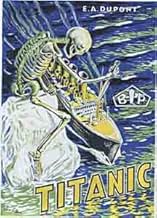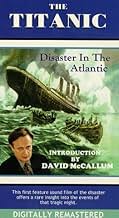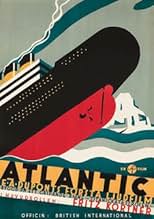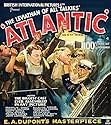Füge eine Handlung in deiner Sprache hinzuOn its maiden voyage in April 1912, the supposedly unsinkable RMS Titanic hits an iceberg in the Atlantic Ocean.On its maiden voyage in April 1912, the supposedly unsinkable RMS Titanic hits an iceberg in the Atlantic Ocean.On its maiden voyage in April 1912, the supposedly unsinkable RMS Titanic hits an iceberg in the Atlantic Ocean.
- Regie
- Drehbuch
- Hauptbesetzung
Gordon James
- Capt. Collins
- (as Sydney Lynn)
Empfohlene Bewertungen
let me firstly say that too many of these reviewers ,particularly the film student,are viewing the film in a modern context and not as a film made at the coming of sound.In an interview given by John Longden for the BBCs programme "Yesterdays witness" he stated that the ridiculously long pauses between dialogue were entirely the idea of the director.So it is unfair to blame the actors for this.Also in that same programme sound men were interviewed.They said that the effects were recorded on a liner berthed at Tilbury.The ship was linked by phone line to Elstree studios.Before each effect someone would come on the line to describe the effect and it would be recorded at Elstree.The problems with early sound films were quite apparent here.few directors here or in America had the skill of Hitchcock in adapting to the new medium.In fact one should praise the attempt to tell the story in what was then effectively a new medium rather than decry the effort some 84 years later because it is old fashioned.no doubt in the year 2097 young film students will be looking at the like of Man of Steel and chuckling at its antique quaintness.
From what I understand this was the first movie about the RMS Titanic that featured sound and it was produced in English, German and French (along with a silent version as well). The title was changed to "Atlantic" for fear of lawsuits. In any case, this film essentially depicts a small handful of passengers who have some interpersonal drama going on both before and after the ship hits the iceberg and begins to sink. Initially, most of the passengers are unaware that the ship is sinking which compounds the problem even more. At least that is the scenario that is portrayed in this particular film. Whether any of that is true or not is unknown to me. Be that as it may, I believe that in order for a person to enjoy this movie it is necessary to appreciate the era in which this film was made and for the viewer to make certain allowances for that fact. Likewise, although there have certainly been better films produced pertaining to the subject at hand, this is still a decent movie overall and I have rated it accordingly. Slightly above average.
True this movie is creaky by today's standards. It's a British maritime story & British production directed by a German Expressionists director who himself was getting acquainted with sound at the time. I had waited a long time to see this film in it's entirety when I found a video two-tape copy in a Sam Goodys. Before I had only seen clips of this in Titanic documentaries. If the Producers changed the Title from Titanic to Atlantic it was more in conjunction with the movie being made only 17 years after the real disaster. Many of the survivors' relatives would have been alive and well and lawsuits would have probably abounded from them as well as The White Star Line, the Titanic's owner, which was still up and running and had an image to uphold. Remember at this time the White Star Line considered the Titanic as a ship they'd rather forget. But even with the title being Atlantic the film's makers infringed upon an earlier White Star disaster in 1873 with over 300 lives lost. The ship from the 1873 disaster was called: THE ATLANTIC. The biggest White Star disaster 39 years before the Titanic.
This movie, based on an earlier stage production, was a big undertaking for 1929 sound film. Dupont is obviously a novice with sound technique. Dialogue from characters such as Tate-Hughes is often spoken in a slow-witted fashion presumably for some kind of stage effect. Characters are given names to protect the identities of the real life victims. So Captain EJ Smith-becomes-"The Captain", Charles Lighttoller-becomes-simply "Lanchester", Ben Guggenheim-becomes-"Tate-Hughes" albeit in a wheel chair and so on. Charleston type music is played instead the Ragtime & Waltzes that were actually heard on the Titanic. But Dupont set a standard with this film that all later Titanic films imitated in one way or another. This film shows the goings-on on the bridge, scenes of the engine room(pretty good by the way), the effects on important first class passengers, the steerage passengers in the lower holds and the sinking, while very stagey, is handled poignantly with the cast singing Nearer My God To Thee...this was imitated in the 1953 Titanic w/Barbara Stanwyck. But there was no visual aspect of the actual ship sinking. Perhaps a bit to harrowing to portray since it was only 17 years and the disaster would've still been fresh in some survivors minds.
Most Titanic buffs should want to see this just to see how 1929 audiences would have handled the sinking of the Titanic as told through a fictional ship called Atlantic. It's an obvious story on the Titanic but done to protect survivors & relatives of which many were living at the time. Seeing this, one can compare it to Titanic(1953), A Night To Remember(1958 classic), the made for tv S.O.S Titanic(1979) or the recent James Cameron Oscar winner. I would give it just for historical purposes 2 1/2 stars out of 4.
This movie, based on an earlier stage production, was a big undertaking for 1929 sound film. Dupont is obviously a novice with sound technique. Dialogue from characters such as Tate-Hughes is often spoken in a slow-witted fashion presumably for some kind of stage effect. Characters are given names to protect the identities of the real life victims. So Captain EJ Smith-becomes-"The Captain", Charles Lighttoller-becomes-simply "Lanchester", Ben Guggenheim-becomes-"Tate-Hughes" albeit in a wheel chair and so on. Charleston type music is played instead the Ragtime & Waltzes that were actually heard on the Titanic. But Dupont set a standard with this film that all later Titanic films imitated in one way or another. This film shows the goings-on on the bridge, scenes of the engine room(pretty good by the way), the effects on important first class passengers, the steerage passengers in the lower holds and the sinking, while very stagey, is handled poignantly with the cast singing Nearer My God To Thee...this was imitated in the 1953 Titanic w/Barbara Stanwyck. But there was no visual aspect of the actual ship sinking. Perhaps a bit to harrowing to portray since it was only 17 years and the disaster would've still been fresh in some survivors minds.
Most Titanic buffs should want to see this just to see how 1929 audiences would have handled the sinking of the Titanic as told through a fictional ship called Atlantic. It's an obvious story on the Titanic but done to protect survivors & relatives of which many were living at the time. Seeing this, one can compare it to Titanic(1953), A Night To Remember(1958 classic), the made for tv S.O.S Titanic(1979) or the recent James Cameron Oscar winner. I would give it just for historical purposes 2 1/2 stars out of 4.
How interesting that E.A. Dupont who created one of germany's most memorable silent films (VARIETY) also helmed one of England's first talkies. Obviously he was uneasy with the medium of talking pictures, note how the first 6 minutes of this film is entirely visual. Most of the cast had stage experience, you can tell because they over-exaggerate their lines and cannon out the words like they were playing to the back row. Still this is a well paced dramatic film and the final few minutes have an impact that can stand on their own alongside the later versions, TITANIC and A NIGHT TO REMEMBER. (I am deliberately excluding James Cameron's film with its budget that would have fed a 3rd World country for 10 years and its plethora of computer FX.)
No movie with Madeleine Carroll in its cast could possibly be unwatchable. That said, I have to add that this British film comes close. The story takes place on board the `SS Atlantic' and it's loosely based on the `Titanic's' unfinished voyage. The word `unsinkable' is spoken, the liner strikes an iceberg, and we hear a heavenly choir sing `Nearer My God to Thee.' The doomed passengers eventually take over the anthem, in a clever bit of sound work. But the year of the film's release (1929) means that a modern viewer has to accept otherwise primitive sound and many of the acting conventions of silent films and the stage. These aren't problems. The film's major flaw is pacing, and pacing had been well developed in silents. However, if the dialog were delivered at a realistic speed, the movie's running time would be cut in half. The intended effect was drama (and clarity in a new medium), but the result unhappily is tiresome now. The film's structure is preposterously illogical and inept. Paradoxically, I found certain details of the editing quite modern in technique: fine, abrupt cuts from one area of the ship to another, sometimes even on sound effects. Although we're on board the `Atlantic' from the first shot, we were well over 4 minutes into the movie before I discovered that fact. There are long, intrusive musical passages by the ship's dance orchestra. (Entertaining, easy sound.) Personal stories are presented in an utterly uninvolving and unconvincing way. Don't even think of spectacle. The berg is a tiny thing and the exterior damage it does to the ship's hull is a minor dent. However, the scenes of passengers swarming into the lifeboats - clearly staged on a real liner, presumably tied up to a dock - generate great excitement. Other than the glorious Miss Carroll, these sequences are the film's only points of excellence. As the movie and the ship near their end, the screen goes totally black several times when the power generators begin to fail. Their last, eternal blackout is the end of the film, with a sunset/sunrise tacked on, a clumsy symbolic effect. `Atlantic' is a cinema curiosity. At best.
Wusstest du schon
- WissenswertesThe White Star Line forbade the production company from referring to the ship in this film as The Titanic.
- PatzerThe women's hairstyle and dresses are from 1929.
- Alternative VersionenReleased with separate English, French and German soundtracks.
- VerbindungenAlternate-language version of Atlantik (1929)
- SoundtracksWalking With Susie
(uncredited)
Written by G.H. Elliott
Played by the ship's band as Larry and Monica enter the Smoking Room.
Top-Auswahl
Melde dich zum Bewerten an und greife auf die Watchlist für personalisierte Empfehlungen zu.
Details
- Erscheinungsdatum
- Herkunftsland
- Sprache
- Auch bekannt als
- Titanic: Disaster in the Atlantic
- Drehorte
- Produktionsfirma
- Weitere beteiligte Unternehmen bei IMDbPro anzeigen
Box Office
- Budget
- 2.000 £ (geschätzt)
- Laufzeit1 Stunde 30 Minuten
- Farbe
- Seitenverhältnis
- 1.20 : 1
Zu dieser Seite beitragen
Bearbeitung vorschlagen oder fehlenden Inhalt hinzufügen




































